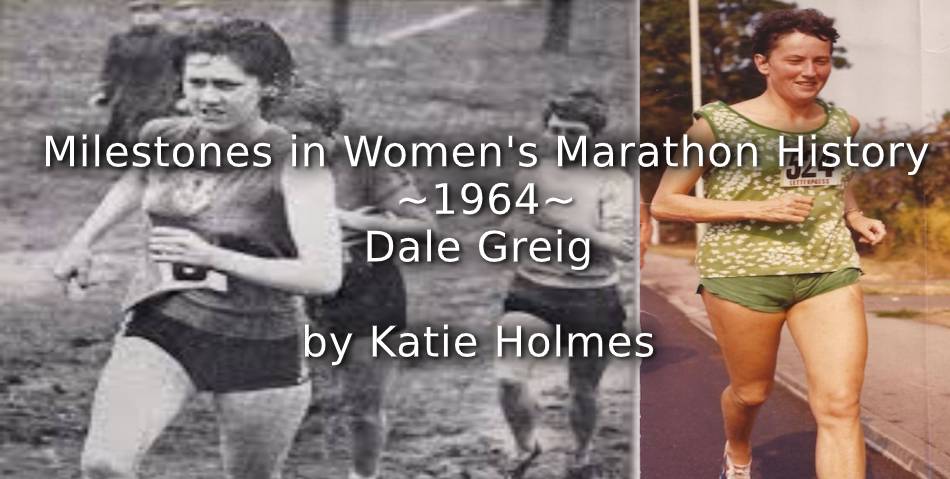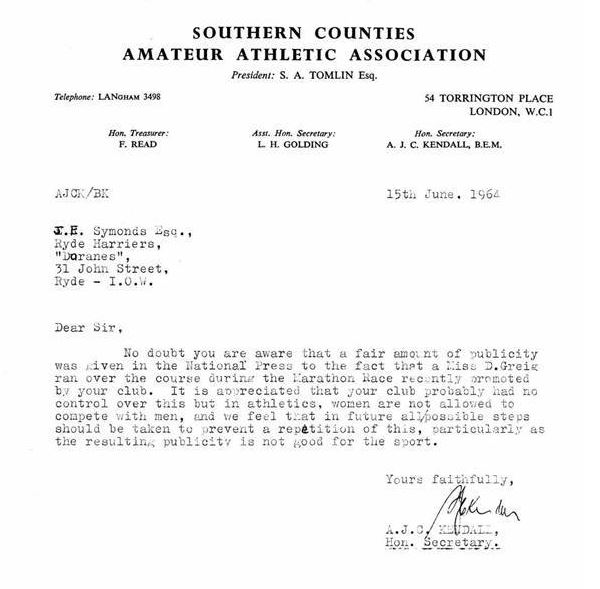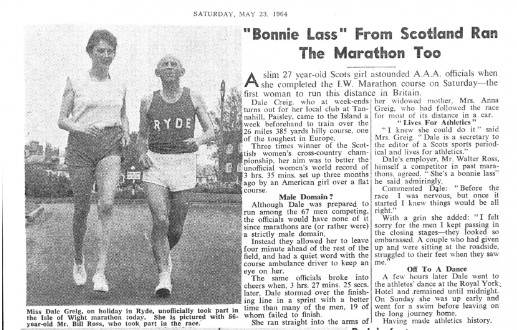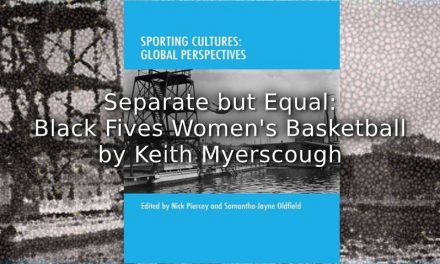For a woman to run a marathon in 1964 she had to be a rule breaker.
Women worldwide were not permitted to run marathons by the governing bodies of athletics. In the UK, the longest distance women ran in races was 3 miles in cross country but races were often shorter. The furthest track distance for women was the mile. Road running was very much the preserve of men.
Scottish athlete Dale Greig from Paisley (1937-2019) was that rule breaker.
An accomplished athlete, Greig won medals at 880 yards (half mile) and the mile at the Scottish National Track and Field Championships in the late 1950s. She finished in the top 3 in the Scottish National Cross Country Championships for 11 consecutive years (1958-1968), winning the title four times, and represented Scotland at the International Cross Country Championships.
Supporters
Dale Greig had to find event organisers who were willing to allow her to break the rules. Her marathon run wouldn’t have happened without the support of Ryde Harriers.
Ryde Harriers had organised the Isle of Wight Marathon since 1957. Until 1976 it was an exclusively male event, but they made an exception in 1964.
Another key supporter of Greig’s marathon endeavour was her business partner, the publisher and printer Walter Ross, who published “The Scots Athlete” magazine from 1946 to 1958 and was a keen proponent of athletics for all.
Walter Ross’s brother, Bill, lived on the Isle of Wight and was a member of Ryde Harriers. He arranged for Greig to run. Greig and her mother travelled to the Isle of Wight, arriving a few days before the race. Greig had been on holiday to the Isle of Wight before and had run some of the route of the race. Walter Ross was also there for the race.
Press photos taken for a local newspaper before the race show Dale Greig running in a well-manicured suburban street and smiling directly at the camera. She’s wearing a plain, sleeveless top, cotton shorts and plimsolls, probably her outfit for the race.
http://Embed from Getty Images
Isle of Wight Marathon 1964
The marathon took place on Saturday 23rd May. Whilst Ryde Harriers were supportive of Greig’s attempt to run the marathon, they tried to avoid breaking the Amateur Athletics Association rules, by making her start four minutes ahead of the men. This meant they could argue she was not part of the official race.
Greig reported that she was followed round by an ambulance. The image of a female runner being followed by an ambulance in case she collapses chimes with the prevailing view that distance running was too strenuous for women and could irreparably harm their reproductive health.
Of the 67 men who started the race, 19 failed to finish. Dale Greig finished strongly catching up with several men. She crossed the line in 3 hours 27 minutes and 25 seconds (later incorrectly recorded as 45 seconds), a new world best time.
Press coverage
The race attracted some coverage in the local and national press and the Southern Counties Amateur Athletics Association were quick to voice their disapproval, pointing out in a letter to Ryde Harriers, dated 15th June, that “in athletics women are not allowed to compete with men, and we feel that in the future all possible steps should be taken to prevent a repetition of this, particularly as the resulting publicity is not good for the sport”.
- Source: Ryde Harriers website (rydeharriers.co.uk/photos)
The Monday edition of the Daily Mirror reported that Greig had run the marathon and that she planned to challenge American Merry Lepper to a race. Greig had beaten Lepper’s world best time (3:37:07) set at the Culver City Marathon on 16th December 1963. The brief article finished dismissively “The idea does not intrigue us. Forget it Dale!”
-
Local newspaper article showing Dale Greig with Bill Ross who also ran the marathon.
Source: Ryde Harriers website (rydeharriers.co.uk/photos)
The Daily Herald, in an article entitled “Dale aims to be champ”, describes Greig as “the slim Scots girl who shook the athletics world by becoming the first woman in Britain to run a full marathon course.” It repeats the story of a challenge to Merry Lepper. Whether this was true or not, Greig was clearly annoyed by the Daily Mirror’s article and on 28th May the paper reported it had received a letter from her saying “Forget it. I’m challenging no-one.”
-
Daily Mirror, Monday 25th May.
Source: British Newspaper Archive (www.britishnewspaperarchive.co.uk)
The British Library Board. With thanks to Trinity Mirror. Digitised by Findmypast Newspaper Archive Limited. All rights reserved.
Greig was not the first British woman to run a marathon. World Athletics recognises one other world best marathon time before Greig’s: Englishwoman Violet Piercy’s time of 3:40:22, set in 1926.
Later athletics career
Dale Greig carried on competing in athletics and in the early 1970s ran in several more races that did not officially admit women, including the 40-mile Isle of Man ultramarathon, the Ben Nevis 10-mile mountain race and the London to Brighton 53-mile race. In 1974, she became world champion in the inaugural IGAL Masters Marathon Championships in Paris.
Her running career ended abruptly in 1982 when she cracked bones in her feet in an accident.
A footnote in athletics history
Whilst Dale Greig was a well-known figure in Scottish athletics, most people don’t know that the UK had a world best marathon runner before Paula Radcliffe. Greig’s achievement has become something of a footnote in history.
It was to be many years after Greig’s race before UK marathon organisers started to admit women to their races. Barnsley AC states that the Barnsley Marathon was the first to do so in 1975. Another nine years would pass before the women’s marathon made it on to the Olympics programme.
In this context, Greig’s marathon was a milestone. However, she experienced a tension between her personal motivation for running it, which she ascribed to enjoying running and wanting to challenge herself, and the wider social significance of the act. In later life, she insisted that she wasn’t a pioneer: “I never considered myself as championing women’s rights. I ran because I loved being outdoors.”
Dale Greig contributed to increasing opportunities for women in athletics for nearly thirty years, holding positions in Scottish and Masters athletics organisations.
Article © Katie Holmes
………………………………………………………………………………………………………
Sources:
“The winners who weren’t: Trail-blazer who broke the rules”, Simon Turnbull, The Independent, 4th October 1997.
“Dale Greig – marathon pioneer”, Doug Gillon, Athletics Weekly, 30th October 2002.
“Take a bow, Paula, but you owe it all to Dale”, Doug Gillon, The Herald, 24th April 2015.
Dale Greig, Scottish Distance Running History website, 9th September 2015.
Tribute by Arnold Black, Scottish Athletics historian, Scottish Athletics website, 19th May 2019.
“Marathon pioneer Dale Greig dies”, Jason Henderson, Athletics Weekly, 23rd May 2019.








